Dental Care: Essential Tips for a Healthy Smile 2023
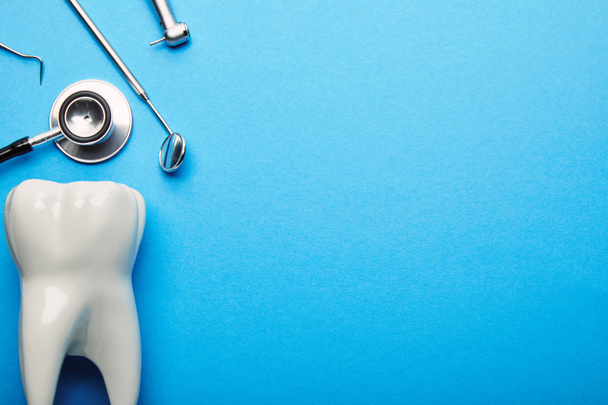
Dental care includes maintaining healthy teeth, including oral hygiene and professional dental treatment. It involves keeping the mouth and teeth clean to prevent dental disorders and encompasses dentistry services such as oral hygiene and dental surgery.
Proper dental care includes daily activities like brushing teeth twice daily with fluoride toothpaste, flossing daily, and maintaining a healthy diet while avoiding sugary foods and drinks. It is also important to replace toothbrushes regularly and keep dental appliances clean.
By prioritizing dental care, individuals can ensure their teeth’ overall health and well-being.
Importance Of Dental Care
Maintaining dental care is essential for healthy teeth. It involves practicing oral hygiene, such as regular brushing and flossing, and seeking professional care from dentists to prevent dental disorders and maintain optimal oral health.
The Impact of Dental Health on Overall Well-Being:
Good oral hygiene has a direct impact on overall health and well-being. Here’s how:
- Oral health issues like gum disease and tooth decay can lead to more severe health problems like heart disease and diabetes.
- Infections in the mouth can spread to other body parts, affecting the immune system.
- Poor oral health can also cause chronic pain, difficulty in eating, and speech problems.
How Dental Care Contributes To A Healthy Smile:
Regular dental check-ups and cleanings help maintain oral health and prevent dental problems. Here’s how dental care contributes to a healthy smile:
- It prevents tooth decay and cavities by removing plaque and tartar buildup.
- It helps detect early signs of gum disease, allowing for timely intervention and treatment.
- Promotes fresh breath by addressing underlying causes such as plaque and bacteria buildup.
- Improves the appearance of teeth by addressing discoloration, misalignment, and other cosmetic issues.
- Enhances overall confidence and self-esteem by ensuring a healthy and beautiful smile.
Remember, caring for your teeth and gums is not just about aesthetics. It plays a vital role in your overall well-being. Regular dental care can help prevent dental problems, keep your smile healthy, and contribute to better overall health.
So, prioritize your dental health and visit your dentist regularly for check-ups and cleanings.
Daily Dental Care Routine
Maintaining a daily dental care routine is crucial for a healthy smile. Brush your teeth twice daily, floss daily, use fluoride toothpaste and replace your toothbrush every few months to keep your teeth in optimal condition.
Brushing Techniques For Optimal Oral Hygiene:
- Use a soft-bristled toothbrush: This helps to gently clean your teeth without causing damage to the enamel or gums.
- Brush at a 45-degree angle: Position the bristles at a 45-degree angle to your gumline and apply gentle pressure. This allows the bristles to reach the area where the teeth meet the gums.
- Use gentle, circular motions: Move the toothbrush in small, circular motions to effectively remove plaque and food particles from all surfaces of your teeth.
- Remember the inner surfaces: Brush the inner surfaces of your teeth using the same circular motions, paying extra attention to the back molars.
- Brush your tongue: Gently brush your tongue to remove bacteria and freshen your breath.
- Brush for two minutes: Aim to brush your teeth for two minutes each time, covering all surfaces thoroughly.
The Importance of Flossing and Interdental Cleaning:
- Routine flossing: Flossing removes plaque and food particles that may be trapped between your teeth and along the gumline. It helps prevent gum disease and tooth decay.
- Choose the right floss: Choose a floss that works best for you, such as waxed or unwaxed, flavored or unflavored, or floss picks. Experiment with different options until you find the one that feels most comfortable.
- Proper flossing technique: Hold the floss tightly between your thumbs and forefingers and gently slide it between each tooth in a sawing motion. Curve the floss around each tooth and slide it against the tooth surface and under the gumline.
- Interdental brushes: These tiny brushes are designed to clean the spaces between your teeth where floss can’t reach. Use them to remove plaque and debris from these tight spaces.
- Water flossers: Water flossers use a steady stream of water to remove plaque and debris between your teeth and the gumline. They are beneficial for people with braces or dental implants.
Using Mouthwash Effectively:
- Choose an appropriate mouthwash: Look for a mouthwash specifically designed to address your oral health needs, such as fluoride mouthwash for cavity prevention or antibacterial mouthwash for gum disease.
- Use it after brushing and flossing: Rinse your mouth with mouthwash after brushing and flossing to help kill any remaining bacteria and freshen your breath.
- Follow the instructions: Read and follow the instructions on the mouthwash label carefully to ensure you are using it correctly.
- Swish for the recommended time: Most mouthwashes recommend swishing for 30 seconds to 1 minute. Make sure to cover all areas of your mouth during this time.
- Spit, don’t swallow: After swishing, spit out the mouthwash. Avoid swallowing it, as some mouthwashes contain ingredients not meant to be ingested.
- Don’t rinse with water immediately: To allow the mouthwash to continue working, avoid rinsing your mouth with water immediately after using it.
Maintaining a daily dental care routine that includes effective brushing, flossing, and mouthwash is essential for optimal oral hygiene and overall dental health.
Nutritional Tips For Dental Health
Proper dental care is crucial for maintaining good oral health. Follow these nutritional tips, including eating a balanced diet, limiting sugary foods and drinks, and staying hydrated, to keep your teeth and gums healthy.
Maintaining proper nutrition is essential for achieving optimal dental health. The foods we consume play a significant role in the strength of our teeth and gums. In this section, we will explore foods that promote strong teeth and gums and the foods to avoid for better dental health.
Additionally, we will discuss the role of hydration in maintaining oral health.
Foods That Promote Strong Teeth And Gums:
- Milk and dairy products: These are excellent sources of calcium, which is crucial for strong teeth and bones.
- Crunchy fruits and vegetables: Apples, carrots, and celery are natural toothbrushes, stimulating saliva production and scrubbing plaque.
- Leafy greens: Spinach, kale, and other leafy greens are rich in vitamins and minerals that promote gum health.
- Nuts and seeds: These provide essential nutrients like calcium, phosphorus, and magnesium, which contribute to healthy teeth and gums.
- Lean proteins: Incorporating lean meats, poultry, fish, and eggs into your diet helps maintain strong tooth enamel.
Foods to Avoid for Better Dental Health:
- Sugary snacks and beverages: Consuming excess sugar leads to tooth decay and gum disease. Limit your candies, cookies, soda, and other sugary treats.
- Acidic foods and drinks: Citrus fruits, tomatoes, and carbonated beverages can erode tooth enamel over time. Consume these in moderation and rinse your mouth with water afterward.
- Sticky and chewy foods: Foods like caramel, taffy, and dried fruit can stick to your teeth, increasing the risk of cavities. Brushing and flossing after consuming these foods is essential.
- Starchy snacks: Chips, crackers, and bread can break down into sugars and get trapped in the crevices of your teeth, leading to tooth decay.
The Role Of Hydration In Maintaining Oral Health:
Good hydration is crucial not just for overall health but also for maintaining oral health. Here’s why:
- Saliva production: Drinking an adequate amount of water stimulates saliva production, which helps neutralize acid, wash away food particles, and prevent dry mouth.
- PH balance: Water helps maintain a healthy pH level in the mouth, limiting the growth of bacteria and reducing the risk of tooth decay and gum disease.
- Tooth remineralization: Water contains essential minerals like fluoride that aid in re-mineralizing tooth enamel, making it stronger and more decay-resistant.
- Fresh breath: Staying hydrated helps combat bad breath by preventing dry mouth, often leading to the buildup of odor-causing bacteria.
Incorporating these nutritional tips into your daily routine while staying hydrated can significantly improve your dental health. Remember to brush your teeth twice daily, floss regularly, and visit your dentist for routine check-ups to maintain optimal oral hygiene.
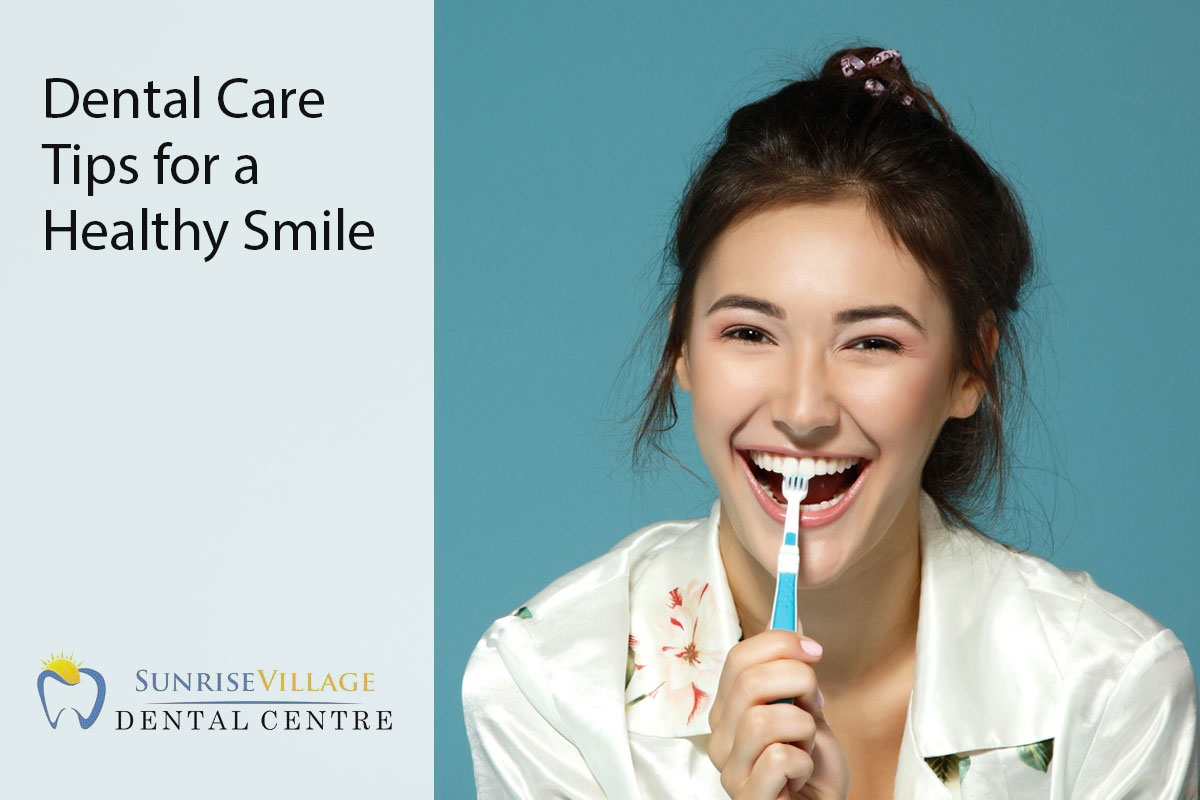
Credit: sunrisevillagedental.com
Regular Dental Check-Ups
Regular dental check-ups are essential for maintaining good dental care. These check-ups ensure dental issues are detected and treated early, preventing further damage and promoting overall dental health.
The Benefits Of Dental Check-Ups:
- Prevention of dental issues: Regular dental check-ups can help detect any early signs of dental problems such as cavities, gum disease, or oral cancer. Early detection allows for timely treatment, preventing the progression of these issues.
- Professional cleaning: During a dental check-up, a dental hygienist thoroughly cleans your teeth, removing plaque and tartar buildup. This helps prevent tooth decay and gum disease, keeping your teeth and gums healthy.
- Oral health education: Dentists provide valuable information and guidance on proper oral hygiene practices, including brushing and flossing techniques. They can also address any concerns or questions about your dental health.
- Overall health implications: Poor oral health has been linked to various systemic health conditions such as heart disease, diabetes, and respiratory infections. Regular dental check-ups can help identify oral health issues affecting your overall well-being.
Recommended Frequency Of Dental Visits:
- It is generally recommended to visit the dentist every six months for a dental check-up. However, the frequency may vary depending on individual factors such as oral health history, risk of dental problems, and the dentist’s recommendation.
- Some individuals with a higher risk of dental issues, such as those with a history of gum disease or frequent cavities, may need to visit the dentist more frequently, such as every three to four months.
- Children, teenagers, pregnant women, and individuals with certain medical conditions may also require more frequent dental visits to ensure optimal oral health.
What to Expect During a Dental Examination:
- Dental examinations usually discuss your oral health history, concerns or symptoms, and changes or issues since your last visit.
- The dentist will then thoroughly examine your mouth, including your teeth, gums, tongue, and other oral tissues. This may involve using dental instruments, such as a mirror and probe, to check for signs of cavities, gum disease, or abnormalities.
- X-rays may be taken to get a more detailed view of your teeth and jawbone, allowing the dentist to detect hidden dental problems.
- The dentist will also check for signs of oral cancer, such as examining your throat and neck for lumps or abnormal tissues.
- After the examination, the dentist will discuss their findings with you and recommend any necessary treatments or preventive measures. They may also provide oral hygiene instructions and advice on maintaining good oral health.
Regular dental check-ups are crucial for maintaining oral health and preventing dental problems. Schedule your appointments as your dentist recommends to ensure a healthy and beautiful smile.
Preventative Measures For Dental Problems
Maintaining good dental care is crucial for preventing dental problems. By following preventative measures such as brushing and flossing daily, using fluoride toothpaste, and visiting the dentist regularly, you can ensure optimal oral health and reduce the risk of dental issues in the future.
Importance of Fluoride in Preventing Cavities:
- Fluoride is a vital tool in preventing cavities and maintaining good dental health.
- It helps to strengthen tooth enamel, making it more resistant to acid attacks from plaque.
- Fluoride can be found in many sources, including toothpaste, mouthwash, and tap water.
- Using toothpaste with fluoride and drinking fluoridated water can significantly reduce the risk of cavities. Dentists may also recommend additional fluoride treatments, such as fluoride varnishes or gels, for extra protection.
The Role of Dental Sealants in Protecting Teeth:
- Dental sealants are a protective coating applied to the biting surfaces of teeth, particularly the molars and premolars.
- They act as a barrier to prevent bacteria and food particles from getting trapped in the deep grooves and pits of the teeth.
- Dental sealants are most commonly used in children and teenagers, but adults can also benefit from them.
- Sealants are easy to apply and painless, requiring no drilling or removal of tooth structure.
- They can effectively reduce the risk of cavities in the protected teeth by up to 80%.
Tips for Avoiding Gum Disease:
Gum disease, also known as periodontal disease, is a common oral health problem that affects the gums and supporting structures of the teeth. If left untreated, it can lead to gum inflammation, bleeding, bad breath, and eventually tooth loss.
Here are some tips to prevent gum disease:
- Practice good oral hygiene by brushing your teeth at least twice daily and flossing daily.
- Use an antibacterial mouthwash to reduce plaque and bacteria in the mouth.
- Visit your dentist regularly for professional cleanings and check-ups.
- Avoid smoking and limit alcohol consumption, which can contribute to gum disease.
- Eat a balanced diet of fruits, vegetables, and whole grains to support gum health.
- Manage stress levels, as stress can weaken the immune system and make you more prone to gum disease.
Remember, taking preventative measures for dental problems is essential for maintaining good oral health. Incorporating fluoride, dental sealants, and the following tips for gum disease prevention can help keep your teeth strong and healthy. Consult with your dentist for personalized recommendations based on your specific needs.
Oral Hygiene For Different Stages Of Life
Maintain optimal dental care throughout different stages of life with a carefully crafted oral hygiene routine. Brush twice daily with fluoride toothpaste, floss regularly, and eat a nutritious diet to ensure healthy teeth at every age.
Dental Care
Having good dental hygiene is crucial for maintaining healthy teeth and gums throughout our lives. Oral hygiene practices vary depending on the different stages of life, from childhood to pregnancy and into our senior years. This section will explore the specific dental care needs for children and infants, dental care during pregnancy, and dental care for seniors.
Dental Care For Children And Infants:
- Regular brushing: Start cleaning your child’s gums with a soft cloth or infant toothbrush even before the first tooth erupts. Once teeth start coming in, use a small, pea-sized amount of fluoride toothpaste and gently brush their teeth twice daily.
- Flossing: Begin flossing as soon as adjacent teeth touch, usually around age 2 to 2.5. Use a child-friendly flossing tool or dental floss designed for kids to remove plaque and food particles between teeth.
- Dental visits: Introduce your child to dental visits at an early age, around 1 year old, or within 6 months after the first tooth emerges. Regular check-ups help detect potential issues and build a positive association with dental care.
- Healthy diet: Encourage a balanced diet rich in fruits, vegetables, and calcium-rich foods like dairy products. Limit sugary snacks and drinks to prevent tooth decay.
Dental Care During Pregnancy:
- Regular brushing and flossing: Maintaining good oral hygiene is essential during pregnancy. Brush your teeth at least twice daily and floss daily to remove plaque and prevent gum disease.
- Dental check-ups: Schedule a dental appointment during the first trimester to address any existing dental issues. Routine cleanings can be done during the second trimester to ensure optimal oral health throughout pregnancy.
- Morning sickness management: Rinse your mouth with water and baking soda after vomiting to neutralize stomach acid that can erode tooth enamel. Avoid brushing immediately after vomiting, as it can further damage the enamel.
- Nutritional support: Ensure a well-balanced diet with plenty of vitamins and minerals, particularly calcium and vitamin D, to support healthy teeth and bones for the mother and the baby.
Dental Care For Seniors:
- Daily oral hygiene routine: Brush your teeth twice daily with fluoride toothpaste and floss daily to remove plaque. Consider using an electric toothbrush or flossing tools designed for seniors to make the process easier.
- Denture care: Clean dentures regularly and remove them at night to give your gums a break. Soak them in a denture cleaner or a mild solution to keep them fresh.
- Regular dental check-ups: Continue visiting your dentist for regular check-ups and cleanings. This helps to monitor oral health, detect any issues early on, and maintain healthy teeth and gums.
- Nutrition and hydration: Eat a balanced diet with fruits, vegetables, and dairy products. Stay hydrated to promote saliva production, which helps protect against tooth decay.
Remember, practicing good oral hygiene at every stage of life is crucial for maintaining a healthy smile. Whether caring for your child’s teeth, navigating dental care during pregnancy, or ensuring dental health as a senior, these tips can help you prioritize oral hygiene.
The Link Between Dental Health And Overall Health
Maintaining good dental health is crucial for overall well-being. You can prevent dental disorders and safeguard your overall health by practicing proper dental care, such as regular brushing, flossing, and dental check-ups.
How Dental Health Impacts Systemic Conditions:
Poor dental health can lead to various systemic conditions due to the connection between the mouth and the rest of the body. Bacteria and inflammation in the mouth can travel through the bloodstream and affect different organs and systems.
The following are some examples of how dental health can impact systemic conditions:
Cardiovascular health:
- Studies show gum disease may increase the risk of heart disease and stroke.
- The inflammation caused by gum disease can contribute to plaque formation in the arteries.
Respiratory health: - Poor oral hygiene can lead to respiratory infections and pneumonia.
- Harmful bacteria in the mouth can be inhaled into the lungs, causing respiratory problems.
Diabetes control: - There is a two-way relationship between diabetes and gum disease.
- People with diabetes are more prone to gum disease, making it harder to control blood sugar levels.
Pregnancy complications: - Pregnant women with gum disease have a higher risk of premature birth and low birth weight.
- Hormonal changes during pregnancy can make the gums more susceptible to inflammation and infection.
Cognitive decline: - Some studies suggest a link between gum disease and cognitive decline or Alzheimer’s disease.
- Chronic inflammation in the mouth may contribute to the development of neurodegenerative disorders.
Common Health Issues Related To Poor Oral Health:
Neglecting dental hygiene can lead to various health issues beyond just dental problems.
Here are some common health issues that can occur as a result of poor oral health:
Tooth decay:
- Failure to maintain good oral hygiene can result in tooth decay and cavities.
- Tooth decay can cause pain, discomfort, and difficulty eating and speaking.
Gum disease: - Poor oral hygiene can lead to gum disease or periodontal disease.
- Gum disease can cause gum inflammation, bleeding, and gum recession.
Bad breath: - Neglected oral hygiene can result in persistent bad breath or halitosis.
- Bad breath can be embarrassing and may indicate underlying dental problems.
Tooth loss: - If dental issues are left untreated, they can progress to tooth loss.
- Missing teeth can affect chewing ability, speech, and overall oral health.
Oral infections: - Lack of oral hygiene can contribute to developing oral infections, such as abscesses.
- Oral infections can cause pain and swelling and may require invasive dental procedures.
The Importance Of Maintaining Good Dental Hygiene For Overall Well-Being:
Maintaining good dental hygiene is crucial for overall well-being and long-term health.
Here’s why it’s essential to prioritize dental care:
Prevention of dental problems:
- Regular brushing, flossing, and dental check-ups can help prevent tooth decay, gum disease, and other oral health issues.
- Early detection and treatment of dental problems can save you from more extensive and expensive dental procedures.
Improved systemic health: - Good dental health can contribute to better overall health and reduce the risk of systemic conditions.
- You can protect your cardiovascular and respiratory health by preventing the spread of bacteria and inflammation from the mouth to the rest of the body.
Confidence and self-esteem: - Healthy teeth and gums can improve your smile and boost your self-confidence.
- Feeling good about your oral health can positively impact your well-being and social interactions.
Better digestion and nutrition: - Proper oral function, including chewing and biting, is essential for adequate digestion.
- Healthy teeth and gums allow you to eat nutritious foods, promoting better overall nutrition comfortably.
Long-term cost savings: - Investing in regular dental care can help prevent costly dental treatments.
- By addressing dental issues early on, you can avoid the need for more extensive and expensive procedures down the line.
Remember, your dental health is not just about a brilliant smile. It plays a significant role in your overall health and well-being. Prioritize good dental hygiene and regular dental check-ups to safeguard oral and systemic health.
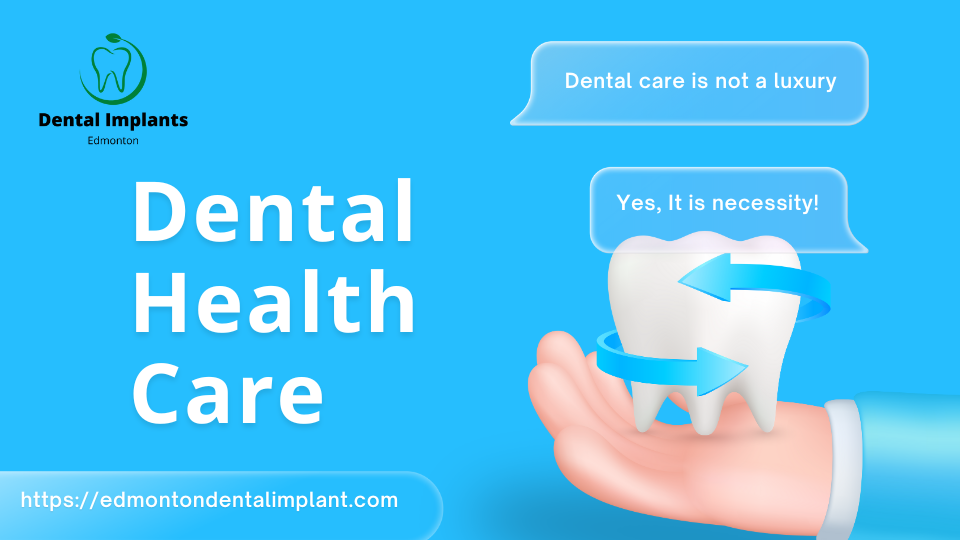
Dental Care For A Beautiful Smile
Maintaining healthy teeth is crucial for a beautiful smile. Dental care includes regular brushing, flossing, fluoride toothpaste, and visiting your dentist for check-ups and cleanings. By following these practices, you can ensure a healthy and radiant smile.
Having a beautiful smile can significantly boost your confidence and overall appearance. There are various dental care options available to enhance your smile. This section will explore some teeth whitening options and tips, the benefits of orthodontic treatment, and popular restorative dental procedures for enhancing smile aesthetics.
Teeth Whitening Options And Tips:
- Over-the-counter whitening toothpaste: These toothpastes contain mild abrasives that help remove surface stains from the teeth.
- Whitening strips: These thin, flexible strips coated with whitening gel are placed over the teeth and left on for a specific duration, typically twice daily.
- Professional teeth whitening: Considered the most effective option, professional whitening treatments are performed by dental professionals using specialized bleaching agents.
The Benefits Of Orthodontic Treatment:
- Straighter teeth: Orthodontic treatment, such as braces or clear aligners, can correct misaligned teeth, resulting in a straighter smile.
- Proper bite alignment: Orthodontic treatment can help correct issues with your bite, ensuring that your upper and lower teeth fit together correctly.
- Improved oral health: Straighter teeth are easier to clean, reducing the chances of plaque buildup, tooth decay, and gum disease.
- Enhanced facial aesthetics: Orthodontic treatment can improve the overall appearance of your face by creating a harmonious balance between your teeth and facial features.
Restorative Dental Procedures For Enhancing Smile Aesthetics:
- Dental veneers: These thin, custom-made shells are bonded to the front of the teeth to enhance their shape, color, and overall appearance.
- Dental implants: Implants are artificial tooth roots surgically placed into the jawbone, providing a solid foundation for replacement teeth.
- Dental bonding: This procedure involves applying tooth-colored resin to the teeth, improving their shape, filling in gaps, and masking minor imperfections.
- Dental crowns: Crowns are tooth-shaped caps placed over damaged or misshapen teeth, restoring their strength, function, and aesthetics.
- Dental bridges: Bridges replace missing teeth by attaching artificial teeth to adjacent natural teeth, creating a seamless smile.
Proper dental care and hygiene are essential for maintaining a beautiful smile. Regular brushing, flossing, and routine dental check-ups are crucial in preserving the health and appearance of your teeth.
Dental Care Tips For Specific Situations
Discover dental care tips for specific situations to maintain optimal oral health. You can prevent dental disorders and ensure a healthy smile with thorough brushing, flossing, and regular check-ups. Trust the professional care of dentistry to keep your teeth in excellent condition.
Dental Care For Individuals With Braces
Proper dental care is crucial for individuals with braces, as braces can trap food and bacteria, leading to tooth decay and gum disease. Here are some tips to ensure dental health while wearing braces:
- Brush after every meal: Use a soft bristle and fluoride toothpaste to clean your teeth and braces. Brush in small circles and thoroughly remove any food particles or plaque.
- Floss daily: It may be a bit more challenging with braces, but flossing is essential to reach areas that a toothbrush can’t. Use a floss threader or special orthodontic floss to clean between your teeth and under the wires.
- Use an interdental brush: These small, cone-shaped brushes can help clean around the brackets and between the wires. Gently insert the brush and move it back and forth to dislodge any trapped food or plaque.
- Avoid sticky and hard foods: Certain foods can damage braces or get stuck in them, so it’s best to avoid sticky candies, popcorn, nuts, and hard fruits and vegetables.
- Visit your dentist regularly: Regular dental check-ups are even more crucial when you have braces. Your dentist can assess your oral health, clean your teeth, and adjust your braces.
Dental Care During Orthodontic Treatment
Orthodontic treatments, such as braces or aligners, can significantly improve your smile and oral health. To ensure success during this treatment, follow these dental care tips:
- Maintain good oral hygiene: Brush your teeth thoroughly at least twice daily, using fluoride and a soft-bristle toothbrush. Pay extra attention to cleaning around your braces or aligners to remove any plaque and prevent tooth decay.
- Wear elastics as prescribed: If your orthodontist recommends elastic bands to correct your bite, wear them as instructed. Elastics play a crucial role in aligning your teeth and should be worn consistently.
- Follow a proper diet: Stick to a braces-friendly diet that avoids hard, sticky, or crunchy foods that can damage your braces. Opt for softer options that are easier to chew and won’t harm your orthodontic appliances.
- Attend regular orthodontic check-ups: Schedule and attend all your orthodontic appointments as your orthodontist recommends. These check-ups allow them to monitor your progress and make any necessary adjustments to your treatment plan.
- Be patient: Orthodontic treatment takes time, and patience is essential. Follow your orthodontist’s instructions, and remember that the result will be a beautiful, healthy smile.
Managing Dental Health With Chronic Illnesses
Living with a chronic illness can present unique challenges when maintaining dental health. Here are some tips to manage your dental health while dealing with a chronic illness:
- Communicate with your dentist: Inform your dentist about your chronic illness, including any medications you take. This allows them to tailor your dental treatment to your needs and potential medication interactions.
- Practice good oral hygiene: Brush your teeth at least twice a day using a soft-bristle toothbrush and fluoride toothpaste. Clean your tongue and floss daily to remove any plaque and bacteria.
- Stay hydrated: Some chronic illnesses or medications may cause dry mouth, increasing tooth decay risk. Drink plenty of water throughout the day to keep your mouth moist and wash away bacteria.
- Control sugar intake: Certain chronic illnesses may require dietary restrictions, including reducing sugar intake. Limiting sugary foods and drinks can help prevent tooth decay and maintain oral health.
- Consider visiting a specialist: Depending on your chronic illness, you may benefit from seeing a dentist specializing in treating patients with similar conditions. They can provide specialized care and guidance tailored to your specific needs.
Remember, dental care is essential to maintain good oral health regardless of your specific situation. Following these tips ensures that your teeth and gums stay healthy even in unique circumstances.
Habits To Avoid For Better Dental Health
For better dental health, it is essential to avoid certain habits. These habits include neglecting daily brushing and flossing, consuming excessive sugary foods and drinks, using tobacco products, grinding teeth, and skipping regular dental check-ups.
Clean to prevent dental issues such as cavities, gum disease, and bad breath. Regular dental care involves brushing and flossing daily and visiting a dentist for check-ups and cleanings. In addition to these routine practices, certain habits should be avoided to maintain optimal dental health.
This section will explore the impact of smoking and tobacco on oral health, the risks of excessive alcohol consumption, and the effects of nail biting and teeth grinding on dental health.
Impact Of Smoking And Tobacco On Oral Health:
- Smoking and tobacco use can have severe consequences on oral health.
- Cigarettes and other tobacco products contain harmful chemicals that can damage teeth and gums.
- Smoking increases the risk of periodontal disease, oral cancer, and tooth loss.
- Tobacco use can also cause bad breath and tooth discoloration.
- Quitting smoking and avoiding tobacco products is essential for maintaining good oral health.
The Risks Of Excessive Alcohol Consumption:
- Excessive alcohol consumption can negatively impact oral health.
- Alcohol dries out the mouth, reducing saliva production and increasing the risk of tooth decay and gum disease.
- Alcohol abuse can lead to oral cancer and other oral health problems.
- Drinking alcohol excessively can also contribute to bad breath.
- Limiting alcohol intake and practicing moderation is crucial for maintaining dental health.
Effects Of Nail-Biting And Teeth Grinding On Dental Health:
- Nail-biting and teeth grinding, also known as bruxism, can harm teeth and jaw muscles.
- Nail-biting can chip or crack teeth and may lead to jaw misalignment.
- Teeth grinding can wear down tooth enamel, causing sensitivity and increasing the risk of tooth fractures.
- Both habits can lead to temporomandibular joint (TMJ) disorders.
- Seeking appropriate treatment and finding alternative coping mechanisms are essential for protecting dental health.
Certain habits can significantly impact dental health. Avoiding smoking and tobacco, limiting alcohol consumption, and finding alternatives to nail-biting and teeth-grinding are crucial for maintaining optimal oral health. By prioritizing these habits, individuals can reduce the risk of oral health issues and ensure a healthy and beautiful smile.
Dental Care Products And Recommendations
Maintain a healthy smile with dental care products and recommendations. Practice oral hygiene by brushing and flossing daily, using fluoride toothpaste, and replacing your toothbrush regularly. Eat a balanced diet and limit sugary foods for optimal dental health.
Choosing the right toothbrush and toothpaste:
- Opt for a soft-bristled toothbrush to avoid damaging your tooth enamel and gums.
- Selecting a toothbrush with a smaller head allows for better maneuverability in hard-to-reach areas.
- Look for toothbrushes with the American Dental Association (ADA) seal of approval.
- ADA-approved toothpaste that contains fluoride strengthens tooth enamel and prevents cavities. Consider electric or sonic toothbrushes, which can provide more thorough cleaning and remove plaque effectively.
Benefits of using mouthwash and dental floss:
- Mouthwash helps freshen breath and kill bacteria that may cause plaque and gum disease.
- It can reach areas that brushing may miss, reducing the risk of cavities and gum problems.
- Use an alcohol-free mouthwash if you have sensitive gums or dry mouth.
- Daily flossing removes food particles and plaque between teeth and the gumline.
- Flossing reduces the risk of gum disease and tooth decay, creating a healthy oral environment.
Recommendations for specialized dental care products:
- Earthly Remineralizing Tooth Powder: A natural alternative to toothpaste that strengthens enamel and promotes healthy gums.
- DenTek Professional Oral Care Kit: Includes floss picks, interdental brushes, and tongue cleaners for comprehensive oral care.
- Dental Herb Company Tooth & Gums Paste: An herbal toothpaste formulated to reduce gum inflammation and combat bacteria.
- GUM Soft-Picks: Convenient interdental cleaners that effectively remove plaque and massage the gums.
- GUM Proxabrush Go-Betweens: Ideal for cleaning between teeth, braces, and bridges.
- Philips Sonicare Cordless Power Flosser: A battery-operated device that uses high-frequency vibrations to clean between teeth.
Remember, maintaining good oral hygiene is crucial for overall oral health. Choose dental care products that suit your needs and stick to a consistent oral care routine to keep your smile healthy and bright.
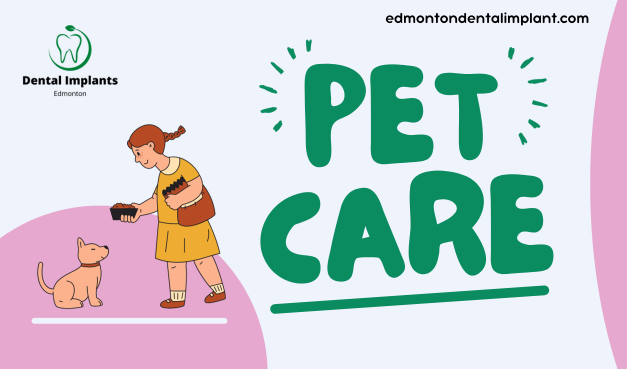
Dental Care And Oral Hygiene For Pets
Ensure a healthy smile for your furry friend with proper dental care. Brushing their teeth regularly and providing dental treats or toys can help prevent dental disorders and maintain oral hygiene.
Importance Of Dental Care For Pets
- Dental care is crucial for pets as it helps maintain their overall health and well-being.
- Poor oral hygiene in pets can lead to various dental issues, such as gum disease, tooth decay, and bad breath.
- Dental problems can also affect other parts of a pet’s body, including the heart, kidneys, and liver.
- Regular dental care can prevent costly and painful dental procedures later on.
- Caring for a pet’s teeth is essential to responsible pet ownership.
Tips For Maintaining Good Oral Hygiene In Pets
- Brush your pet’s teeth regularly using a pet-friendly toothbrush and toothpaste.
- Introduce tooth brushing gradually, starting with short sessions and rewarding your pet with treats and praise.
- Use dental chews and toys to promote oral health and reduce plaque buildup.
- Feed your pet a balanced diet that promotes good dental health, such as dry kibble.
- Schedule regular dental check-ups with your veterinarian to ensure your pet’s teeth and gums are in good condition.
The Role Of Professional Veterinary Dental Care
- Professional veterinary dental care is vital in maintaining your pet’s oral health.
- Veterinarians have the expertise and tools to perform thorough dental examinations and cleanings.
- They can detect and treat dental issues early, preventing them from progressing into more severe conditions.
- Veterinary dental procedures may include dental X-rays, extractions, and treatments for gum disease.
- Regular visits to the veterinarian for dental care are essential for ensuring your pet’s teeth and gums stay healthy.
Regular dental care and good oral hygiene are vital for your pet’s overall health and well-being. By following these tips and seeking professional veterinary care, you can help your furry friend maintain a healthy and happy smile.
Frequently Asked Questions On Dental Care
What Is The Meaning Of Dental Care?
Dental care means maintaining healthy teeth through oral hygiene and professional dental treatment.
What Is The Best Way To Take Care Of Your Teeth?
To take care of your teeth, floss daily, brush twice daily with fluoride toothpaste, and replace your toothbrush every 3 to 4 months. Eat a healthy diet, avoid sugary foods and drinks, don’t smoke, and keep dental appliances clean.
How To Afford A Lot Of Dental Work?
To afford dental work: 1. Consider dental insurance or discount plans to help cover costs. 2. Look for dental clinics or schools that offer discounted services. 3. Ask your dentist about payment plans or financing options. 4. Take care of your oral health with regular brushing, flossing, and dental check-ups to avoid significant treatments.
What Does Good Dental Care Include?
Good dental care includes:
- Daily brushing and flossing.
- Using fluoride toothpaste.
- Eating a healthy diet.
- Regular dental check-ups.
Conclusion
Taking care of your dental health is essential for your overall well-being. You can maintain a healthy and beautiful smile for years by following a few simple practices. First, brush your teeth at least twice daily using a soft-bristled toothbrush and fluoride toothpaste.
Remember to replace your toothbrush every three to four months or sooner. Daily flossing is also crucial to remove plaque and food particles between teeth. Additionally, eating a balanced diet and avoiding sugary foods and drinks can help prevent tooth decay.
Visiting your dentist for regular check-ups and professional cleanings is also essential. You can enjoy a strong and vibrant smile by practicing good oral hygiene and seeking professional care when needed. Remember, caring for your teeth is an investment in your overall health and confidence.



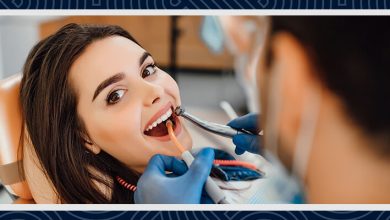


23 Comments